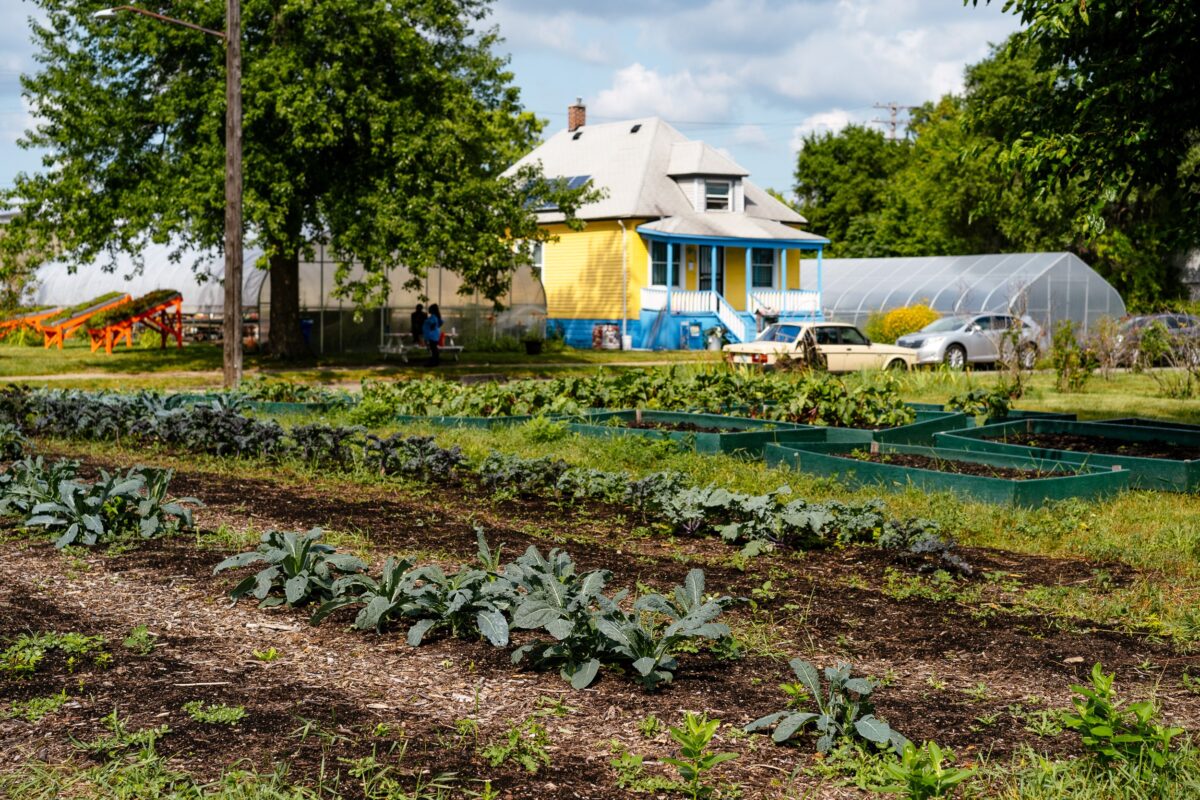Overview:
- Alice Bagley, a farmer and longtime resident of Detroit's North End, has overcome land ownership struggles for her farm, Fields of Plenty, through a lease with the Detroit Cultivator Community Land Trust.
- This trust, dedicated to community land control and preserving affordable housing and food access, has enabled Bagley to grow food and share it with neighbors, fostering community spirit.
- The trust also works to acquire land and help longtime residents remain in their homes amid rising property values and gentrification.
Alice Bagley’s path to stable farmland in Detroit’s North End wasn’t easy. A farmer and longtime resident of the neighborhood, she spent years trying to buy land to build infrastructure for her farm, Fields of Plenty. But the property she sought was tied up in a larger real estate deal, making ownership unattainable.
“I was farming in another location for several years and trying to buy the land, but it just wasn’t working out,” Bagley said. “I wanted to invest in infrastructure like greenhouses and irrigation systems, but it didn’t make sense to commit without a long-term agreement.”
Her breakthrough came in 2023 when she signed a lease with the Detroit Cultivator Community Land Trust—a nonprofit dedicated to keeping land in community control and preserving affordable housing and food access in the North End.
“Being part of a community land trust, where the land is owned collectively rather than by a single person, aligns with my ethics and beliefs,” Bagley said. “It was one of those moments where a crisis turned into an opportunity.”
For decades, legacy residents in Detroit’s North End have faced displacement due to rising property values and rent, driven by new development and gentrification. Within the past year alone, property values in the North End have increased by 20%, making it increasingly difficult for longtime residents to afford to stay.
When the idea for the DCCLT first took shape, it was in response to a growing crisis that many longtime residents of Detroit’s neighborhoods could no longer ignore. Development in the community had surged to spectacular heights.
“Property values exploded, and rental rates in some cases doubled,” said Jerry Hebron, executive director of Oakland Avenue Urban Farms and a core member of DCCLT. “Legacy residents—people who had lived here for decades, found themselves priced out of their own homes.”
The DCCLT, which some say is the first land trust established in Detroit, was founded in response to these pressures. It offers an alternative to traditional homeownership by ensuring land remains in community hands.
Community land trusts like DCCLT promote long-term affordability by removing land’s market value from the home purchase price, making ownership approximately 20% less expensive, according to Dr. Kami Pothukuchi, professor of Urban Planning at Wayne State University. Buyers agree to resale restrictions, which help maintain long-term affordability. She said the approach benefits first-time and lower-income buyers by offering smaller mortgages.
DCCLT emerged from a collaboration with the University of Michigan’s Taubman College of Architecture and Urban Planning, which helped develop a sustainable model for the trust. The effort was supported by Anya Sirota, Associate Professor at Taubman College and principal at Akoaki Design Studio, which had previously helped secure grant funding for Oakland Avenue Urban Farm, a six-acre community farm run by Hebron.
The land trust officially launched in 2020 after the North End Christian Community Development Corporation made a land gift to DCCLT. It has since grown to 10 acres, with a commitment to reserving 3.5 acres for food production for at least 30 years.
“That first gift of land was the catalyst. It ignited our mission to acquire as much land as possible from the Detroit Land Bank Authority,” Hebron said.
However, acquiring land has been challenging due to restrictions on the number of properties that can be purchased annually without City Council approval. DCCLT has stepped in to purchase homes vacated due to tax foreclosure, working to ensure they remain in community hands.
For now, no residents live on DCCLT-owned land, but that’s changing this year.
“We’re looking forward to having three tenants soon,” Hebron said. “This year, we will have one residential property and two businesses leased.”
A key partner in this effort has been the Detroit Justice Center (DJC), a nonprofit law firm that has guided DCCLT’s legal framework. Attorney Eric Williams, who connected with Hebron through DJC’s community land trust workshops, played a crucial role in securing the trust’s nonprofit status.
For Bagley, the land trust has provided her with stability and access to needed resources. Since leasing half an acre from DCCLT, she has completed two full farming seasons, expanding her operation with reliable access to water for irrigation—a game changer for productivity.
“It has been an incredibly good growing season,” she reflects. “Having access to water for irrigation was a huge upgrade. You can’t farm without water!”
She also values the sense of community.
“Getting to know folks in this part of the neighborhood more deeply has been really great,” Bagley said. “This experience has allowed me to grow food, share it with neighbors, and be part of a collective effort that supports the community.”


